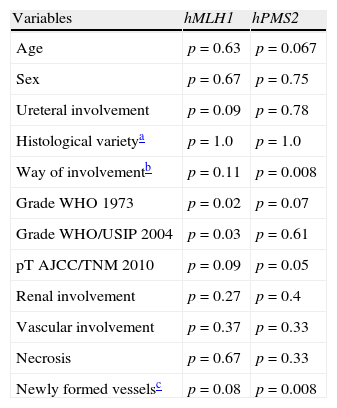Lynch syndrome or hereditary nonpolyposis colorectal cancer is caused by mutations in DNA repair genes, known as mismatch repair (MMR) genes, and is associated with microsatellite instability. Urothelial carcinoma of the renal pelvis is also associated with this syndrome. These genetic abnormalities have been described in sporadic forms of upper tract urothelial carcinoma (UTUC).
Material and methodThis was a descriptive study and survival analysis of a series of 80 patients with sporadic UTUC with no metastases at diagnosis (N0/Nx M0) treated exclusively with nephroureterectomy. We evaluated the expression of MMR genes (hMLH1, hPMS2, hMSH2 and hMSH6) in sections performed with tissue microarray (TMA) and their association with clinical-pathological parameters. We analyzed the prognostic value of the loss of expression of these genes in UTUC.
ResultsWe detected no loss of MSH2 or of MSH6, but there was a loss of MLH1 in 11 cases (13.8%) and of PMS2 in 21 cases (26.3%). The expression of hMLH1 and hPMS2 were strongly associated (P<.0001), and this phenotype expression entails significant clinical implications. The loss of MLH1 was associated with a low grade (P=.02). Loss of PMS2 was associated with a lower stage (P=.05), a pushing pattern with no invasive edges (P=.008) and less angiogenesis (P=.008). The inactivation of hPMS2 or hMLH1 is an independent protective factor (HR, 0.309) and, along with the histologic grade (HR, 5.561), defines the patients’ prognosis.
ConclusionIn our experience, the inactivation of hPMS2 or hMLH1 is an independent marker of good prognosis and occurs in a quarter of sporadic UTUC cases. The immunohistochemical study of these patients can be used to assess the screening of hidden forms of Lynch syndrome.
El síndrome de Lynch o cáncer colorrectal hereditario no polipósico se debe a mutaciones en los genes de reparación de ADN, conocidos como mismatch repair (MMR), y se asocian a inestabilidad de microsatélites. El carcinoma urotelial de la pelvis renal también se asocia a este síndrome, e incluso estas anomalías genéticas se han descrito en formas esporádicas de carcinoma urotelial del tracto superior (CU-TUS).
Material y métodoEstudio descriptivo y análisis de supervivencia en una serie de 80 pacientes con CU-TUS esporádico sin metástasis al diagnóstico (N0/Nx M0) tratados mediante nefroureterectomía exclusivamente. Se evalúa la expresión de genes MMR (hMLH1, hPMS2, hMSH2 y hMSH6) en secciones realizadas con microarray de tejido (TMA) y su asociación con parámetros clínico-patológicos. Se analiza el valor pronóstico de la pérdida de expresión de estos genes en CU-TUS.
ResultadosNo se detectó pérdida de MSH2 ni de MSH6, pero se evidenció pérdida de MLH1 en 11 casos (13,8%) y de PMS2 en 21 (26,3%). La expresión de hMLH1 y hPMS2 se encuentra fuertemente asociada (p<0,0001) y este fenotipo de expresión conlleva importantes implicaciones clínicas. Pérdida de MLH1 se asocia con bajo grado (p=0,02). Pérdida de PMS2 se asocia con menor estadio (p=0,05), patrón empujante sin borde invasivo (p=0,008) y menos angiogénesis (p=0,008). La inactivación de hPMS2 o hMLH1es un factor protector independiente (HR 0,309) y junto con el grado histológico (HR 5,561) define el pronóstico de estos pacientes.
ConclusiónEn nuestra experiencia la inactivación de hPMS2 o hMLH1 es un marcador independiente de buen pronóstico y sucede en la cuarta parte de los CU-TUS esporádicos. El estudio IHQ de estos pacientes puede emplearse para valorar el cribado de formas ocultas de síndrome de Lynch.














